Monty Python's Life of Brian, 1979, directed by Terry Jones, written by Graham Chapman, John Cleese, Terry Gilliam, Eric Idle, Terry Jones, and Michael Palin.
Comedy is one of the hardest genres to write about. Even Robert McKee, who has rules for everything (Sorry! Not rules! Principles!) admits that when it comes to comedy structure, most bets are off. He adds:
Comedy is pure: if the audience laughs, it works; if it doesn't laugh, it doesn't work. End of discussion. That's why critics hate comedy; there's nothing to say.
In a nutshell, that's why comedies don't win Academy Awards, and comedies rarely end up in the Criterion Collection. The exceptions to this rule tend to be satires instead of pure comedies; satires may be "what closes on Saturday night" but you can write about them. Robert Koehler expressed this relatively common view on NPR recently, saying that he preferred Idiocracy to Little Miss Sunshine, because it was "one of the few [comedies of the year] with any ideas." That's true enough, and I liked Idiocracy. But Little Miss Sunshine's last scenes, clichéd as they were, made me laugh so hard I could barely breathe. Which brings me to Monty Python's Life Of Brian. By my count, this is the third comedy in the first 61 films of the collection—and that's only if you count Fishing With John as a comedy (I'd call it more of an oddity, really). Not surprisingly, you can read Life Of Brian as a trenchant satire, if you so choose (you boring, boring person). The only thing that really matters is that it's hilarious.
Life of Brian tells the story of a man born in Bethlehem around 4 BC, hailed as a religious leader during his brief ministry in his 30s, and crucified by the Romans for his trouble. Named Brian. And certainly not that guy from the major world religion, although they did end up in mangers next door to each other.
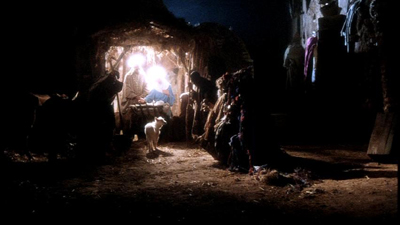
That shot of the Adoration is right after a scene in which the Magi mistakenly give their gold, frankincense, and myrrh to Brian's mother. Her name is not Mary but Mandy, she backhands Brian when he cries, and she's played by Terry Jones in drag, which should give you a pretty good idea of the level of seriousness on display here. Blessed art thou among women, indeed.
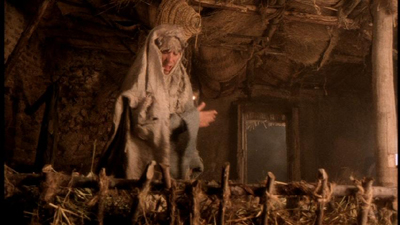
Like the Gospels, Life of Brian is more or less silent about anything that happened between Brian's infancy and adulthood, except for a remarkably silly song during the opening credits. The next person we see is actually not Brian, but his more famous contemporary.
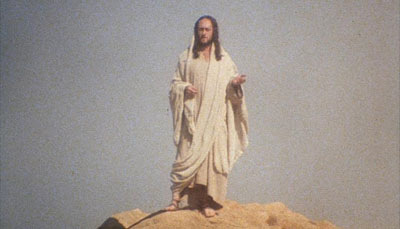
Brian is attending the Sermon on the Mount, however--as the magic of a 70's zoom lens reveals, he and Mandy are in the cheap seats.
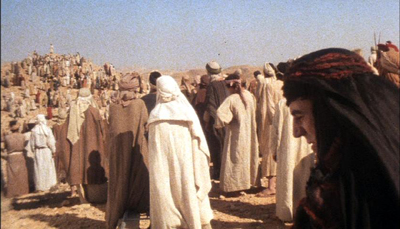
Notice, by the way, the strategically placed valley between the two hills, giving the impression that there's a crowd stretched all the way from Jesus to Mandy. Now that's where a good location manager can make your extras budget stretch a little further. And that's the last time Jesus has anything to do with the movie. Brian has grown into a cheap seats kind of man; he makes his living selling ocelot spleens and jaguar earlobes during children's matinees at the coliseum. Confused about his identity (his mother has just told him that his real father was a Roman named Naughtius Maximus), Brian falls in with a bad lot, a revolutionary group called the People's Front of Judea.
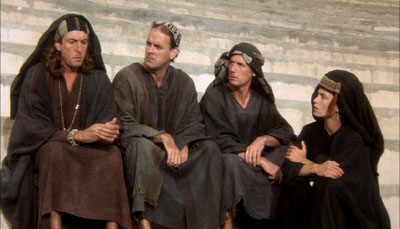
They actually show up in the film earlier, critiquing Jesus' performance ("Blessed is just about everyone with a vested interest in the status quo, as far as I can tell...," "What Jesus blatantly fails to appreciate is that it's the meek who are the problem."). Brian gets involved with their incredibly ineffectual attempts to overthrow their Roman occupiers, and from then on, it's a straight road to his crucifixion. There's not a lot of plot or structure here, but there's more than in any of the other Monty Python films, which are closer to sketch comedy than features. Not that Life of Brian doesn't show its sketch comedy roots; most scenes spend very little time advancing the plot and lots of time going off on tangents. And you can hardly describe a film as tautly constructed when it has time for the main character to be abducted by rubbery aliens for no reason at all.
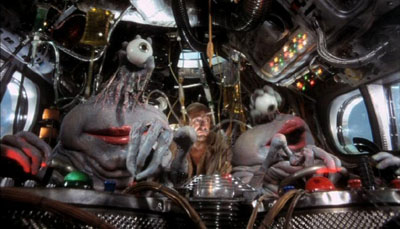
But in the relatively formless world of Monty Python movies, Life of Brian stands out as the best structured, the most movie-like of their efforts. And for a comedy, plot and structure are not as important as hilariousness, which Life of Brian has in spades.
As everyone who's finished middle school knows, Monty Python fans pride themselves on their ability to reenact sketches from the television show and the movies. I've been trying to write this without putting anyone through that, because people tend to have a visceral dislike of Monty Python from hearing nerdy kids doing horrible renditions of the Lumberjack Song. And many of the jokes in Life of Brian lose a lot if you take away their delivery. But I can't write about this movie without commending Michael Palin's Pontius Pilate.
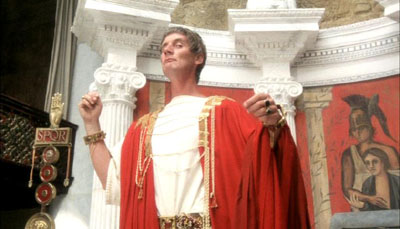
I can't say enough good things about the character, his performance, his speech impediment, or the jokes built around him, but just thinking about him cracks me up. You can see one of his scenes, in which he claims to have "a vewy gweat fweind in Wome called Biggus Dickus" here, at least until YouTube takes it down. The single greatest scene in the film, however, is Life of Brian's version of the release of Barabbas, where the crowd petitions Pilate for the freedom of non-existent prisoner after non-existent prisoner, just to hear him mispronounce his r's ("I will wewease Woddewick the Wobber!") Pilate's friend Biggus Dickus (Graham Chapman) tries to salvage the situation by reading the list of prisoners they actually have in custody. But of course, Biggus Dickus has a lisp, and the list of prisoners goes like this:
- Samson the Sadducee Strangler
- Silas the Assyrian Assassin
- Several seditious scribes from Caesarea
- Sixty-seven seers...
Silly and brilliant. You can make an argument that Life of Brian has a lot to say about mindless religious zeal, or political infighting among leftist movements, or Hollywood's relentlessly trivial Biblical epics of the 50's and 60's. But if you need more to motivation to see a movie than Graham Chapman talking with a lisp, this probably isn't your cup of tea.
Randoms:
- Monty Python's Life of Brian had a development history that could charitably be described as "troubled." EMI was set to produce and distribute, but Lord Delfont, the head of the company, pulled the plug two days before the planes took off for Tunisia to begin shooting. Fortunately, George Harrison, a huge fan of the group, founded HandMade Films with Denis O'Brien expressly to finance the movie (apparently because he wanted to see it). Harrison has a brief cameo as Mr. Papadopoulos, who is loaning the Mount to Brian to give a sermon:
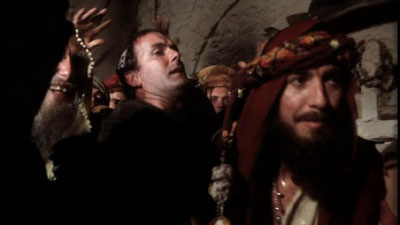
- Lord Delfont (given name, Bernard) also gets a brief shout-out; in the voiceover at the end of the film, Eric Idle remarks, "They'll never make their money back, you know. I told him, I said to him, Bernie, I said, they'll never make their money back." They did make their money back, of course.
- HandMade Films produced movies through 1990; their last was Nuns on the Run. From then on, it was all over but the lawsuits. Harrison sued O'Brien, the Paragon Entertainment Corporation bought the rights to the company and library, and released some movies (most memorably Lock, Stock, and Two Smoking Barrels) under the HandMade name in the late 90's, before going out of business themselves. The rights to Life of Brian seem to be owned by the Pythons themselves, after successfully suing the Paragon. In any event, at some point, someone who owned the HandMade library had a soft spot for Criterion; other HandMade titles include The Long Good Friday, Time Bandits, Mona Lisa, Withnail and I, and How To Get Ahead in Advertising, all part of the collection on both Laserdisc and DVD.
- Monty Python and the Holy Grail was co-directed by Terry Jones and Terry Gilliam, which apparently was a logistical nightmare (to say nothing of the fact that Graham Chapman was stumbling drunk during the entire production). For Life of Brian, Gilliam handed the reins over to Jones, contenting himself with the film's art and set design. The film looks good, far better than any other Python movie; but Gilliam seems to be still a little bitter that one of his finer set creations doesn't get much screen time. When watching the movie, pay attention to the architecture of Pilate's palace, where Roman details are being sloppily superimposed on a Hebrew temple. Here's the best shot of the interior (though the exterior was designed with the same idea), a throwaway of Pilate giving instructions to his architect. Notice the workmen installing mosaic and frescoes, and the ridiculous columns cutting through the middle eastern patterned balconies. Apparently, Gilliam built a 360-degree set here, and only the Roman half of it is ever visible in the final film.
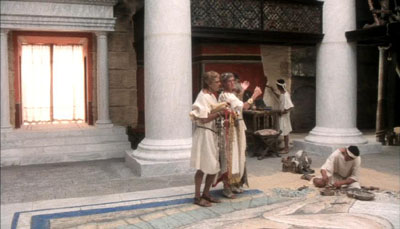
- Some of the sets were reused from Franco Zeffirelli's Jesus of Nazareth miniseries, which was produced by Lew Grade. That's Lew Grade, as in Bernard Delfont of EMI's younger brother. I'm not sure what the family talked about at Thanksgiving that year, but I would like to have been a fly on the wall.
- Before you accuse Michael Palin of insensitivity to people with speech impediments (not just in Life of Brian, but in A Fish Called Wanda), you should be aware that he gave his name to The Michael Palin Centre for Stammering Children, which sounds like a joke, but treats pediatric speech impediments. Palin's father apparently had a severe stammer, which makes me wonder what he thought of Palin's most famous characters.
- Terry Gilliam appears in a few bit roles in the movie, two of which are pretty memorable. He does a remarkably good job playing a perverted, mad jailer in the Roman prison (I won't say too much about his performance because it's best experienced in full).
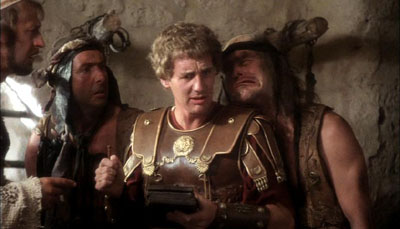
- He also appears briefly as a mud-splattered street preacher raving about the end times:
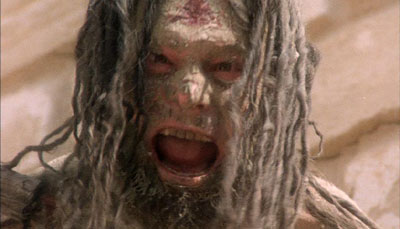
- He's disturbingly convincing in both roles; I wonder if Sid Sheinberg had seen him in this movie when he got the idea that he would be good to work with on Brazil. In any event, I like to think that's how Gilliam shows up to meetings.
- The DVD features Life of Brian's UK radio ads. Palin, Idle, Gilliam, and Cleese got someone related to them to read a brief statement about the movie. Terry Gilliam's mother has a pre-national-television Midwestern accent, which is strange since Gilliam grew up in Los Angeles. The standout, though, is Muriel Cleese, John's mother, who says John has told her that, "If [the movie] doesn't do well, he won't be able to keep me on in the home any longer. So see The Life of Brian, because I'm a hundred and two years old and if I have to leave it'll kill me. "
- One of the bad things about comedy writing as a group is that everyone has their pet jokes that don't make the final version. Apparently, John Cleese has a long memory for this kind of thing, because he pitches two jokes that didn't make it on the DVD commentary track. The first was a casting idea. In the finished film, Kenneth Colley plays Jesus for the thirty seconds or so he's on screen. (You may remember Colley as the unfortunate Admiral Piett in the original Star Wars trilogy). Cleese wanted to cast George Lazenby, so that the posters could read, "George Lazenby IS Jesus Christ!" Lazenby wasn't available. The other joke would have come during the scene where Brian is being chased across Jerusalem by followers proclaiming him the Messiah. As you may recall, he drops some of his possessions during the chase, including a gourd.
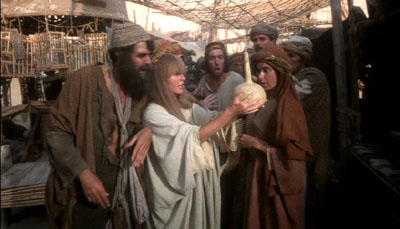
- Cleese wanted to have the gourd fall and shatter, and have one of the followers pick up part of it and proclaim it "the piece of gourd which passeth all understanding."
Matthew-
ReplyDeleteHello again. Tonight I am writing with a question and the hope that you have time to answer it. That is, of course, if it's not against protocol to answer non-Criterion Collection questions. I recently saw Gus Van Sant's Gerry. I was intrigued by some elements of the film and puzzled by others. I am very interested to know what you think of it. If you have yet to see it, then let me simply ask: what do you think of Gus Van Sant's films in general? I have a great amount of respect for your opinion (as illustrated by my last message) and I would really love to hear your take. Thanks for your time.
Jack S.
Jack, as per my usual slack-ass posting schedule, you'll find my response under The Passion of Joan of Arc. Sorry for the delay!
ReplyDeleteThe piece of gourd which passeth all understanding . . . God help me, I love it, I do love it so . . . .
ReplyDeleteA fun fact I recently heard; I can't remember off-hand which Python it is doing it, but Harrison's voice in the film is dubbed by one of the Pythons, because he was unavailable and the original sound was unusable.
ReplyDelete"his mother has just told him that his real father was a Roman named Naughtius Maximus"
The best line in the movie is:
"You mean, you were raped?"
"Well... at first..."
Unfortunately, Graham Chapman tried to make an entire movie full of similarly-pitched rape jokes and none of them worked (that would be 'Yellowbeard').
Anonymous,
ReplyDeleteGeorge Harrison had a pretty amazing career as a producer, albeit a very short one. Haven't seen "Yellowbeard," and probably won't!